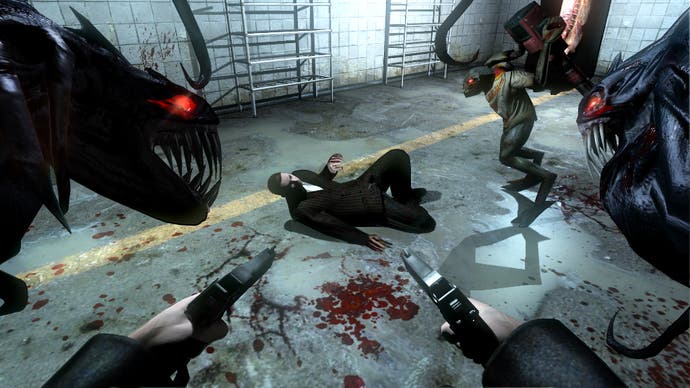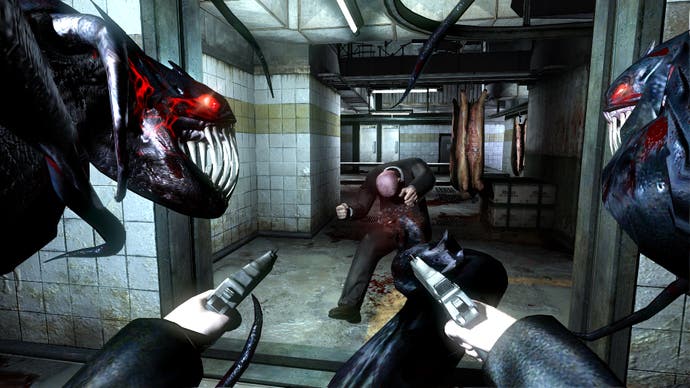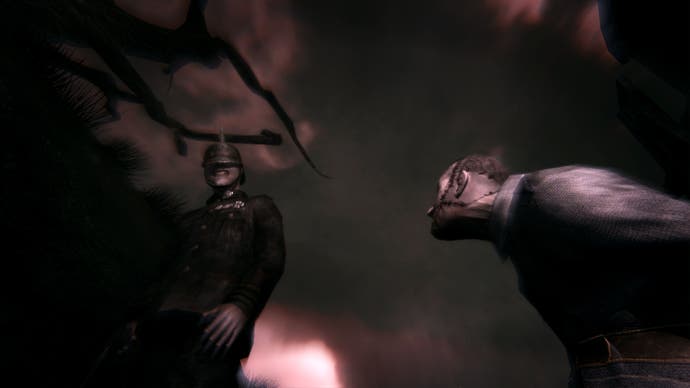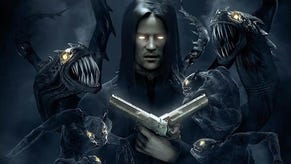The Darkness
Embrace the shadows.
The concept of the hero, it strikes me, has become somewhat diluted in recent years. Where once the chivalrous knight in shining armour was the absolute, straight down the line gold standard of heroism, these days we like our heroes a bit more tortured; a bit darker. Modern heroes wear black trenchcoats, blow up buildings, grapple with their conscience more often than you or I grapple with a bowl of corn-flakes, or dress up like bats and shout in the faces of upside-down men until they wet themselves. Errol Flynn it ain't.
In fact, the modern hero has become such a dark and twisted character that he's started seriously crossing over into the territory formerly occupied by the anti-hero - the black knight, committing evil deeds with a sneer on his lip but somehow endearing himself to the audience with his sarcastic quips and the basic, brutal justice of his quest. The anti-hero is backed into a corner. So where do we draw the line these days?
Swedish developer Starbreeze Studios loves anti-heroes. In Chronicles of Riddick: Escape from Butcher Bay, the team's absolutely stunning Xbox title, you were an (alleged) serial killer escaping from a brutal prison. In their next title, The Darkness, there's equally little confusion as to which side of the hero/anti-hero divide you're on.
Let's put it like this: heroes, even dark heroes, kill their enemies and then make blackly humorous, off-colour quips about the manner of their demise. Anti-heroes kill their enemies, and then rip their faintly pulsing hearts out of their chests, devouring the slick, blood-filled organ with gulping, animal relish. Guess which one Starbreeze has opted for in The Darkness? This isn't a game which is just dark. This is a game which is, with the Riddick pun fully intended, pitch black.
Video(game) Nasty

The Darkness is based on a graphic novel series of the same name, which despite being penned by fantastic comic scribe Garth Ennis, isn't exactly one of the finest examples of the genre. The franchise may or may not also spawn a movie this year - everything seems to have gone a bit quiet since Dimension Films grabbed the rights three years ago.
It is, in other words, something of an inauspicious background - but anyone familiar with Starbreeze knows that that shouldn't be off-putting. The Chronicles of Riddick was simultaneously one of the worst films of the year and one of the best games. Starbreeze are old hands at digging down to the core elements in a character and a universe which make it fun and appealing - and, frankly, a little bit nasty. Nasty enough to keep us hooked.
The Darkness, then, is nasty. You probably guessed that from the bit about the heart-guzzling. It's actually relentlessly nasty in places; there are moments when you revel in your own unpleasantness, and moments when you recoil a little bit, because that's just a little bit too unpleasant. The balance here is important. From our hands-on experience with the game (we've played the whole way through a preview build), it feels like Starbreeze has found just the right mix, deftly applying the intuition of a horror storyteller in balancing out excitement and discomfort.

Like a vulture choosing only the finest morsels from a fresh corpse, the developer has expertly plucked the finest concepts from a decade of The Darkness comics, weaving them into an origin story for the character which is unlike the story of the comics, but almost certainly works better as a videogame. The bulk of the action takes place in a seedy, run-down set of New York environments which remind us of nothing more than Deus Ex's Hell's Kitchen levels. Two grotty subway stations act as hubs for the various levels, and you can pass through them and explore the game world to your heart's content. In this relatively small space, Starbreeze weaves its nasty tale of a contract killer, a mob godfather, and a particularly unpleasant evil power.
We join the anti-hero of the piece, Jackie Estacado, on his 21st birthday - working as a professional hitman for his mobster boss, Uncle Paulie, and out on a job which is going badly, badly wrong. The intro sequence betrays the developer's cinematic aspirations - you start in the backseat during an intense, entirely scripted car chase through a tunnel. Borrowing from Half-Life, the game introduces interaction only gradually; first you can look around from the backseat, then you're moved to the front (after the game's first gruesome death, we might add - under a minute in!) and given a weapon.
The next ten hours or so is a spiralling descent into the mob-run underworld of New York. Jackie is set up by the godfather of his family, the ranting, despotic Uncle Paulie, but survives because of an astonishing dark power which manifests itself in him. This power gives him the tools for a crusade of revenge that gradually escalates in body-count, blood-letting and violence.

The power in question is the eponymous Darkness, and as the screenshots reveal, it manifests itself in the form of two nasty snake-heads on either side of your screen, as well as a multitude of tentacles. The basic strategy behind this manifestation is simple: the Darkness, well, likes darkness. When you're in shadow, it absorbs power; when you're in light, it gradually weakens until such time as it disappears, and you have to find some more shadowy areas to stand in to regain your strength.
Darkness power is important, for a wide variety of reasons. Firstly, it acts as a shield that protects you from bullets - you're far from invincible with the Darkness shielding you, but at least you don't crumple like a sack of spuds at the first touch of a bullet. Secondly, it allows you to see in the dark, surrounding objects in darkness with a ghostly halo which lets you navigate even through pitch black environments.
Finally, it gives you the special powers that this game, at its purest level, is all about.




